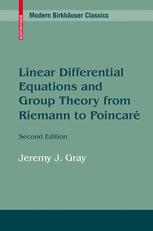

Most ebook files are in PDF format, so you can easily read them using various software such as Foxit Reader or directly on the Google Chrome browser.
Some ebook files are released by publishers in other formats such as .awz, .mobi, .epub, .fb2, etc. You may need to install specific software to read these formats on mobile/PC, such as Calibre.
Please read the tutorial at this link: https://ebookbell.com/faq
We offer FREE conversion to the popular formats you request; however, this may take some time. Therefore, right after payment, please email us, and we will try to provide the service as quickly as possible.
For some exceptional file formats or broken links (if any), please refrain from opening any disputes. Instead, email us first, and we will try to assist within a maximum of 6 hours.
EbookBell Team

4.8
84 reviewsThis book is a study of how a particular vision of the unity of mathematics, often called geometric function theory, was created in the 19th century. The central focus is on the convergence of three mathematical topics: the hypergeometric and related linear differential equations, group theory, and on-Euclidean geometry.
The text for this second edition has been greatly expanded and revised, and the existing appendices enriched with historical accounts of the Riemann–Hilbert problem, the uniformization theorem, Picard–Vessiot theory, and the hypergeometric equation in higher dimensions. The exercises have been retained, making it possible to use the book as a companion to mathematics courses at the graduate level.
"If you want to know what mathematicians like Gauss, Euler and Dirichlet were doing...this book could be for you. It fills in many historical gaps, in a story which is largely unknown...This book is the result of work done by a serious historian of mathematics...If you are intrigued by such topics studied years ago but now largely forgotten...then read this book."--The Mathematical Gazette (on the second edition)
"One among the most interesting books on the history of mathematics... Very stimulating reading for both historians of modern mathematics and mathematicians as well."--Mathematical Reviews (on the first edition)
"The book contains an amazing wealth of material relating to the algebra, geometry, and analysis of the nineteenth century.... Written with accurate historical perspective and clear exposition, this book is truly hard to put down."--Zentralblatt fur Mathematik (review of 1st edition)